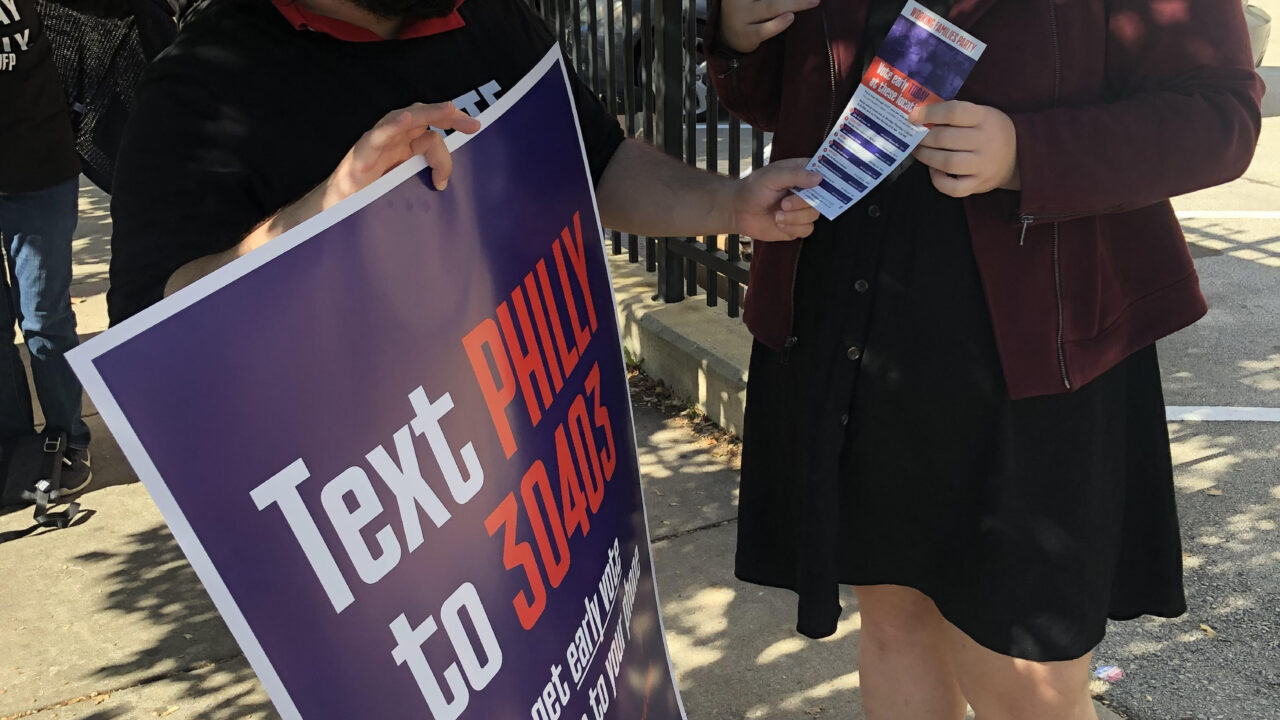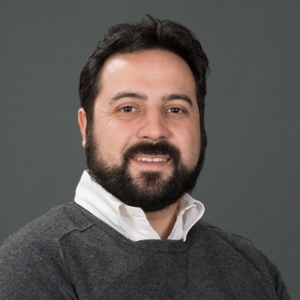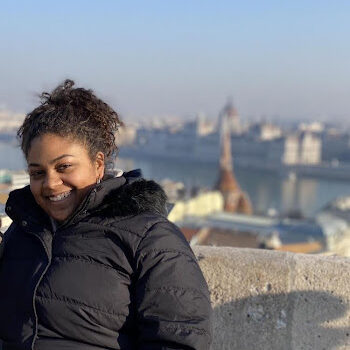Sarandon Elliott always knew she fell to the left of her peers, but she struggled to find an organization that fit her politics. She joined the Young Democrats in high school and interned for a moderate politician after she started community college, but she knew that brand of politics “wasn’t really for me.” The summer before she transferred to the University of Virginia, Elliott discovered the Democratic Socialists of America (DSA). She was working a summer job on Martha’s Vineyard, with its “very obvious wealth gap” — a gap made all the more pronounced that summer by a local bus drivers strike. The strike brought home the “power [of] withholding our labor…. That’s when the wheels started turning in my head.” She found herself scrolling through DSA social media posts. When she got to UVA that fall, Elliott joined the university’s Young Democratic Socialists of America (YDSA) chapter. She’s now the co-chair of the national coordinating committee for the YDSA. In this interview, which has been edited and condensed, longtime DSA and YDSA organizer David Duhalde talks with Elliott about the opportunities and challenges facing YDSA in this moment, her plans to help grow the organization over the next year, and the difference between socialist organizing and other forms of campus activism.
Bernie Sanders was such a big part of DSA’s and YDSA’s explosion. What do you think students were most interested in around his agenda?
[Student debt is] the first thing that comes to mind, really. We’ve seen that it’s affected multiple generations in different ways, and it’s really been a barrier to achieving higher education. Just for basic entry level jobs, you have to have a bachelor’s degree right now. And that wasn’t the way it was with our grandparents. A lot of students, that really was a big issue. Even after Bernie, we ran a College for All campaign from the fall of 2019 to March right before COVID. We were basically doing a lot of letter writing to our Board of Visitors to ask them to freeze tuition. We came to a couple of Board of Visitors meetings when they were still in person in the fall. We did an Action Network petition. We did a lot of tabling, one-on-one conversations.
It’s very clearly a socialist demand for higher education to improve because we want to make it accessible and take the private sector out of what is a common good. What else is your UVA chapter doing as socialists that makes you distinct from the other activist groups doing good work?
One thing that really makes us distinct is our size. YDSA at UVA, we are the largest chapter in the country. We have over 150 due paying members. To win things, to make socialist demands on this campus, we’re going to need hundreds of students. It can’t just be 12, 20, a collective of students fighting for these issues. It has to be all of us. So, I think that’s one of the big things that makes us different. Along those lines, we really emphasize that it’s not just student organizers. We put a special emphasis on workers and worker issues on campus. I think that’s also unique to YDSA.
What are some of those issues that you’ve worked on with the workers on campus?
We have a close relationship with the [union] United Campus Workers Virginia and try to amplify their campaigns [and] helped them get off the ground when they were first starting. They started in February 2020, right before we went home. With COVID, we ran a student workers response campaign and some of our demands included hazard pay for all workers. We also demanded no extra surveillance and policing on grounds during COVID-19, PPE for all workers, stuff like that.
What were some of the ways that you kept people engaged during COVID, and what were some of the ways you couldn’t?
It was really tough to organize online. Especially this past academic year, towards the spring, people just didn’t want to Zoom, they were done with doing extra things. One thing that people really missed is the social aspect of YDSA and DSA. We’re not only comrades, we’re friends so that was really hard. The year that I joined YDSA at UVA, we were doing a lot of social event type things, going to sports games, just hanging out after classes and stuff like that. In those very casual settings, that’s when you talk about socialism and that’s when you talk about organizing and that’s really helped my development as an organizer. [Losing those spaces] was really difficult. At UVA, they did these outdoor tents that the students could study in. When we could, we tried to be like, “Hey, do you want to go grab coffee? Or do you want to study?” That was one way that we tried to keep people engaged. Towards the spring, we tried to do outdoor events, mapped with six feet, stuff like that.
How is YDSA related to the Movement for Black Lives and the uprisings [last summer]?
I’m in Richmond and people were on the streets almost every single day. People would send fliers for actions in the group chat and be like, “Is anyone living in the Richmond area going to this? Let’s link up beforehand and we can go together.” Even though it was COVID, people were like, let’s go to together, let’s be safe, let’s be comrades in this space, support this movement. Social media was such a huge part of last summer. Sharing fliers, sharing real time information, stuff like that. We did a lot of sharing of bail funds, raising money.
A lot of people saw that connection between the struggles that came with COVID, especially for Black and working-class people, and the struggle against police brutality. We were working on our student workers response campaign. UVA is this massive institution that has an almost $10 billion endowment, but they’re really failing Black and brown workers. Lots of people were laid off without notice. There wasn’t much help from the university as far as resources for workers. A lot of students, especially a lot of international students, were left out to dry. I think a lot of people started to see how UVA claimed that they were for racial equity, especially during the uprising for Black lives, but they just weren’t meeting basic needs for Black students and workers.
What other activities and campaigns has national YDSA been focused on?
One thing that they really focused on last year was the rank-and-file pipeline — trainings and seminars that the National Labor Committee put on for YDSA, talking about strategic industries like nursing, teaching, and trying to get students to go into those industries and help revive the labor movement.
YDSA national has [also] always been pretty good at political education. For Black History Month, we did a two-part series. We watched The Black Power Mixtape and then we had a discussion at the end. We also put on a brief presentation about the Black Panther Party and then [had] a discussion. We’ve done reading groups. Especially during COVID, one of the things that kept me sane was attending these reading groups and talking to comrades from across the country about these readings, about these podcasts and tying it back to how we can incorporate this into our organizing.
What inspired you to run for the National Coordinating Committee, and what do you hope to achieve now that you’ve won?
I was on the Political Education Committee last year, and I really liked it. A big thing for me was bridging that connection between national and local chapters. A lot of local chapters aren’t aware of what’s going on at the national level. Getting more people involved in national work is a reason why I wanted to run.
[Another] big reason why I wanted to run was…I went to a community college. I have tons of family that went to HBCUs, and I think that’s where we need to be centering YDSA chapters and building our chapters, so that was a project that I want to work on: developing chapters, developing organizers on those campuses.
And honestly, UVA had an explosive year last year. We won two campaigns. We had this massive growth, so I want every chapter to be able to replicate that and be able to have these big wins and just have massive growth with socialist work.
How many people are on the NCC, and what have you talked about doing in the next few months?
Nine all together. Two big things that we’re talking about is, one, the formation of committees. National Labor Committee, National Education Committee, The Activist, which is the magazine that we put [out] as YDSA, the National Organizing Committee — those are just some of the committees that we’re putting together. We’re trying to basically jumpstart those and get projects rolling with those committees. One thing that we’re also working on is the fall drive; we’re trying to recruit new members and also doing several trainings for new and returning chapters. And basically being like, this is how you recruit, this is how you run a campaign, this is how you run political education. That’s what we’re going to be working on for the next couple of weeks.
We were super small when I was in YDSA. What makes students interested in YDSA over other groups?
It’s really cool to talk to people within YDSA and you’re like, “Why did you join YDSA?” They’ll be like, “Bernie.” And also, frankly, looking at DSA and YDSA, we have 95,000 within the organization. We’re historic for a socialist organization. What also makes people want to join YDSA is looking at our wins. At UVA, we ran a campaign to win a no credit grading option during the fall of 2020. We fought for it, and we won. We fought for a tuition freeze for the 2021-2022 academic year. Again, we fought for it, and we won. We did a massive mutual aid project with students who were in quarantine at the university. That makes people want to join, when they see that not only are you talking a big game, but you’re also putting Ws on the scoreboard. We’re not an NGO that just has certain people lobbying for these wins. It’s everyone in the organization fighting for these wins.
What’s your biggest hope for YDSA during the next year?
I hope we see really big growth. I think it’s really important that we put an emphasis on making sure that Black and brown organizers and students are joining this organization. I think that’s one of the biggest critiques of DSA in general, that it’s a pretty white organization, and I think we saw [that] with Bernie too. [Another] thing for me is rebuilding chapters after COVID; it was a really tough year for a lot of local chapters, and I just want to see every chapter get 100 dues paying members and be able to win a fight for things that are important on their campus.
What do you think is the biggest challenge facing YDSA for the next year nationally?
A lot of national calls are online, [and] I think it might be a little difficult to get people to be in Zoom calls for an hour or two, especially now that things are opened back up. I was talking to a comrade the other day, and they said, “Yeah, on DSA national calls, participation has plummeted as locals get back into in-person.” Which is good and bad, really, because that shows that people are getting more involved in their local chapters, and local chapters are opening back up and being able to do things.
Any last comment you want to make?
I think DSA is in a really historic time. I’m just excited for the growth of this organization and this movement.


